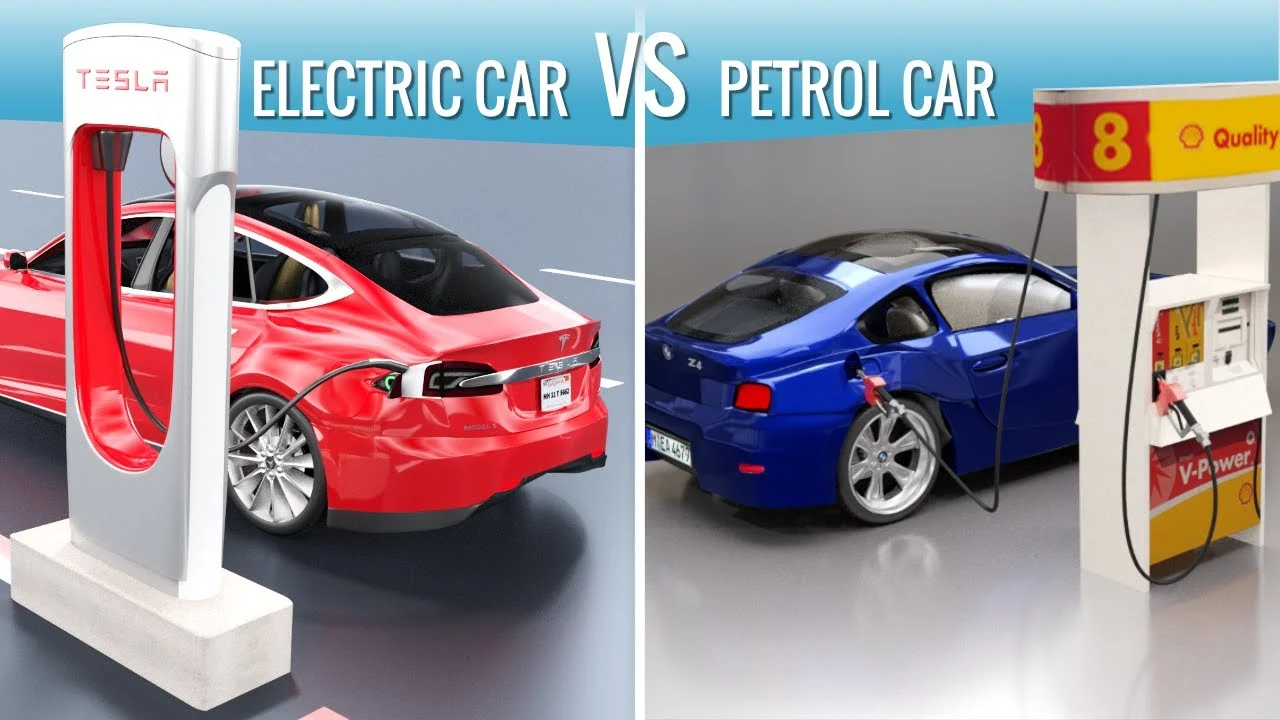The automobile world is changing fast. In 2025, buyers have two main options – Electric Cars or Petrol Cars. Both have their own benefits and downsides. Choosing between them depends on your needs, lifestyle, and budget. In this article, we will help you decide which one is better for you in 2025.
What Are Electric Cars?
Electric cars, also called EVs, run on a battery and electric motor. They don’t use petrol or diesel. You charge them just like a smartphone – using a charger at home or a public charging station.
Examples: Tata Nexon EV, MG ZS EV, Hyundai Ioniq 5, Tesla Model 3.
What Are Petrol Cars?
Petrol cars run on fuel (petrol). They have been in use for more than 100 years. They are powered by an internal combustion engine (ICE) which burns petrol to run the engine.
Examples: Maruti Swift, Hyundai Creta, Honda City, Tata Punch.
Overview Table – Electric vs Petrol Cars
| Feature | Electric Car (EV) | Petrol Car |
| Fuel | Electricity | Petrol |
| Running Cost | Very Low | Higher |
| Maintenance | Low (fewer moving parts) | High (more moving parts) |
| Pollution | Zero tailpipe emissions | Emits CO2 and other gases |
| Charging/Fueling Time | 30 mins to several hours | 2–5 minutes |
| Charging Stations | Still growing | Easily available everywhere |
| Price | Higher upfront cost | Usually cheaper to buy |
| Range (Distance) | 200–500 km on full charge | 500–1000 km on full tank |
| Noise Level | Almost silent | Louder engine sound |
| Government Support | Subsidies and tax benefits | Fewer benefits |
Advantages of Electric Cars
- Low Running Cost:
You spend much less on charging than on petrol. - Eco-Friendly:
EVs do not pollute the air. Good for environment and future generations. - Less Maintenance:
No oil changes, fewer parts to replace, saving money long-term. - Government Support:
In 2025, many state and central governments offer subsidies, lower road tax, and free parking for EVs. - Quiet and Smooth Ride:
No engine noise and instant pickup make EVs fun to drive.
Disadvantages of Electric Cars
- High Price:
The initial cost of buying an EV is still more than petrol cars. - Charging Time:
It takes longer to charge a car than to fill petrol. - Limited Charging Stations:
In small towns or remote areas, charging points are still rare. - Range Anxiety:
Drivers worry about battery running out before reaching a charger.
Advantages of Petrol Cars
- Lower Buying Price:
Petrol cars are more affordable to buy upfront. - Fuel Available Everywhere:
Petrol pumps are everywhere – even in villages. - Better Range:
Petrol cars can travel longer on a full tank compared to many EVs. - Faster Refueling:
Takes just a few minutes to fill fuel and get back on road.
Disadvantages of Petrol Cars
- High Fuel Cost:
Petrol prices are rising every year. - Pollution:
Petrol cars emit harmful gases, which are bad for air quality and health. - High Maintenance:
More parts, more servicing, and more breakdown chances over time. - Less Future-Ready:
With governments pushing EVs, petrol cars may lose value faster.
Which One Should You Choose?
Choose Electric Car If:
- You mostly drive in the city.
- You want to save money in the long term.
- You care about the environment.
- You have charging access at home or office.
- You don’t drive long distances regularly.
Choose Petrol Car If:
- You travel to remote areas often.
- You need longer range and fast refueling.
- You want a low-cost car for now.
- You don’t have easy access to charging points.
- You want to avoid waiting during charging.
Conclusion
In 2025, Electric Cars are becoming more popular and practical. They are cheaper to run, better for the environment, and come with many features. But Petrol Cars still offer better range and easy refueling.
If you are future-focused and want to save more in the long run, go for an electric car. If your travel needs are high or you live in a place with no EV support yet, petrol cars are still a good choice.
Final Tip: Think about your driving habits, location, and budget. Then make a smart choice that suits your lifestyle.

